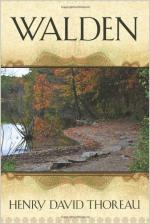|
|
Walden Sounds
After taking a chapter to champion the importance of books, Thoreau now says that they are merely metaphor, and that the truth lies in things around us that are directly observable. He recalls mornings sitting on his stoop contemplating his surroundings, unaware of the passage of time until a passing wagon reminded him that it was noon already. He grew during those periods. He spent all summer hoeing beans, which was better than reading, because it allowed for a close contact with Nature that was similar to his mornings of contemplation. His amusement during this time was cleaning house, because he was able to appreciate the small irony of taking everything out of doors in order to sweep and mop the floor. The pleasure and humor in seeing all his furniture mingled so carelessly with nature - trees, shrubs, and animals - was a constant source of joy. The berries draping over his table were a particularly wonderful sight.
The next paragraph begins the first narrative in the book in the present. He describes hawks and pigeons, and hears the railroad, which reminds him of a boy he heard about who was sent to the country to work on a farm. The boy can't stand the simplicity of the people, and misses the sound of the train whistle. The boy escapes back to the city. Thoreau feels sorry for the boy, and mourns the fact that there is nowhere in Massachusetts anymore where you can't hear a train whistle. Thoreau recognizes that he is related to society by the Fitchburg Railroad, which runs so close to his cabin. Many of the employees of railroad believe he works with them because he's around so often. In reality, he is actually watching the huge amounts of raw materials that are carted off to the city, only to be brought back on a subsequent train for sale.
"To do things 'railroad fashion' is now the by-word; and it is worth the while to be warned so often and so sincerely by any power to get off its track. There is no stopping to read the riot act, no firing over the heads of the mob, in this case. We have constructed a fate, an Atropos, that never turns aside. (Let that be the name of your engine.) Men are advertised that at a certain hour and minute these bolts will be shot toward particular points of the compass; yet it interferes with no man's business, and the children go to school on the other track. We live the steadier for it. We are all educated thus to be sons of Tell. The air is full of invisible bolts. Every path but your own is the path of fate. Keep on your own track, then." Sounds, pg. 120
The goods on the train come from far-away places, as well as from local areas, and remind Thoreau of far-off lands. They are gathered from rich and poor alike to be made into some new product for sale. It is an equalizer to have everyone's second-hand articles stuffed all together. These very characteristic goods remind Thoreau of the static nature of a man's disposition. He is especially taken with the characteristics of Spanish ox tails, which, even after years of tannin and stretching, retain their curl. But Thoreau maintains that he really has no use for the railroad, which whistles and makes him get off the track when he is wonderfully absorbed by what the track has to offer. He quotes a Psalm about the hills and mountains skipping like lambs and rams, like the train as it passes by. It's like, but not as reassuring as, the image of a divine-inspired movement of the earth. And, in addition, the trains are a source of pollution.
Next, Thoreau begins a discussion of the surrounding towns' bells, which he can hear on Sundays from his cabin. Instead of a clear ringing, though, he hears a dispersed sound, which he calls "the universal lyre" because it blends in with the other sounds, and begins to vibrate with them. The echo of the bells is a sound of its own, too, independent of the actual ringing, because it is part of the surroundings which cause it to echo.
Thoreau hears other regular sounds. The whippoorwills begin to sing each evening at 7:30. Screech owls make their eerie scream at night - something Thoreau describes with great power and respect. There was also a hooting owl, who made a sound that was so melancholy, it almost sounded like human sobs, but was melodious from a distance. Thoreau is glad that the owls make these sounds - owls can make maniacal sounds in place of men. Then, there are the bullfrogs, which act like a group of gluttonous party-goers, with their overstuffed call and response each night.
Topic Tracking: My House Outdoors 3
Thoreau talks a little about how he misses the cock crowing, along with other domestic sounds. There is no yard, no gate, no path to the civilized world at Walden that can provide him with these very unique and different sounds. However, in the end, this gets him excited. He enjoys having nature outside, encroaching on the cabin, instead of a yard.




